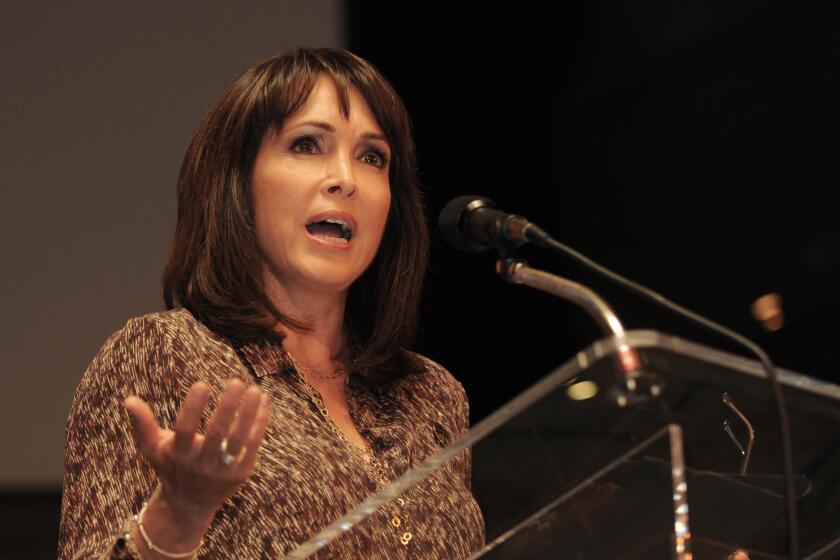TV AND THE GULF WAR : Channel 7 Doesn’t Hear the Voices of Dissent
- Share via
KABC-TV Channel 7--home of the often notorious “Eyewitness News”--is known for resorting to almost anything in the cause of ratings.
And now, say sources at the station, that extends to not covering one particular component of the Persian Gulf War story--local anti-war protests--that it believes will anger many of its viewers.
Ethically, that’s inexcusable. Although the nation’s pro-war fervor is overwhelming, news should not be a popularity contest.
The “Eyewitness News” policy is said to have been in force about a month. “This is so obscene,” said a Channel 7 news staffer. “It’s awful,” said another. Both staffers asked to remain anonymous out of concern for their jobs.
Their accounts are corroborated by others at “Eyewitness News.” Said one staffer: “Even people who were pro-war were upset. But everyone here is so beaten down that it didn’t come out.”
Commenting on charges that Channel 7 has banned coverage of local anti-war demonstrations, General Manager Terry Crofoot termed the reports “absolutely untrue.” Crofoot added: “We’re in the news business. If there’s something on either side of the issue, we’re going to cover it.”
Crofoot maintained that Channel 7 had done “many” stories on local anti-war demonstrations. Asked if he could recall any in the last month, Crofoot, the station’s former news director, replied: “They don’t readily come to mind.”
Many in the media have protested what they believe to be excessive war news management by the Pentagon. But that surely is no more repulsive than this episode of reported war news management at Channel 7.
The number and intensity of anti-war demonstrations have sharply fallen off since earlier in the conflict and polls show overwhelming public support for the conflict. But that doesn’t make the tailoring of news to public opinion any more palatable, whether the subject is the Persian Gulf or Poland.
Even though diminished, anti-war demonstrations of varying sizes still occur locally, such as several last week that were covered by every station here but Channel 7. That was true despite the station’s continual boasts that its vaunted “Eyewitness NewsVan” is everywhere.
The order banning coverage of anti-war demonstrations is said to have come from news director Roger Bell. But the general feeling at Channel 7 is that Bell rarely acts independently, that major policy decisions concerning “Eyewitness News” originate with Crofoot.
A call to Bell’s office was not returned.
“Nothing is on paper, but it’s understood and it’s been reaffirmed repeatedly,” said one of the Channel 7 staffers. “We may occasionally drop in a line (about anti-war demonstrations) at the end of coverage of pro-war demonstrations, but we do not put those protest stories on the air. We do not send a crew out there. We will not cover them unless there is violence or a confrontation.”
Bell is said to have issued his edict at approximately the start of the present ratings sweeps period and in response to a crush of mail and phone calls the station received from viewers angrily protesting its earlier coverage of anti-war protests.
It also came the day before Jan. 27 anti-war rallies in Los Angeles, drawing crowds whose estimates ranged from 2,500 to 20,000 as part of a day of mass global anti-war demonstrations.
Channel 7 was the only local station without footage of the Los Angeles rallies, which included a six-block-long procession that was characterized by some as the city’s largest display of anti-war sentiment since the outbreak of Gulf hostilities.
TV’s relentless quest for colorful, even if meaningless, pictures is visible daily. And like its local news counterparts, Channel 7 ordinarily shows demonstrations of all kinds, even if consisting of only a few marchers with signs. But not these days.
Although the station is generally politically skewed toward conservatism, “This policy has nothing to do with the (anti-war) issue,” one of the news staffers said. “The issue could be reversed and it wouldn’t make any difference. They just don’t want to offend an audience during (ratings) sweeps.”
“The issue here is not politics,” said the other staffer. “The issue is the exclusion of events that have news value. It has the effect in this case of making the station seem like a cheering section for one side of a major issue.”
If the shoe fits. . .
More to Read
The complete guide to home viewing
Get Screen Gab for everything about the TV shows and streaming movies everyone’s talking about.
You may occasionally receive promotional content from the Los Angeles Times.






